

Islam, érotisme, modernité... le testament de Malek Chebel. Marcel Detienne. Yoshua Bengio. Un article de Wikipédia, l'encyclopédie libre.
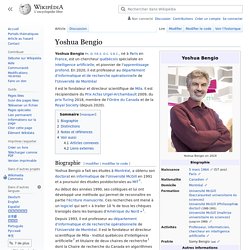
Yoshua Bengio en 2019 Biographie[modifier | modifier le code] Yoshua Bengio a fait ses études à Montréal, a obtenu son doctorat en informatique de l'Université McGill en 1991 et a poursuivi des études postdoctorales au MIT[1]. Au début des années 1990, ses collègues et lui ont développé une méthode qui permet de reconnaître en partie l'écriture manuscrite. Ces recherches ont mené à un logiciel qui sert « à traiter 10 % de tous les chèques transigés dans les banques d'Amérique du Nord »[1]. ELIZABETH BATES. Elizabeth Bates, nommée professeur de psychologie en 1983 à l’université de Californie à San Diego, est cofondatrice, en 1988, du premier département de sciences cognitives aux États-Unis.
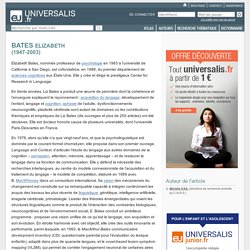
Elle y crée et dirige le prestigieux Center for Research in Language. En trente années, Liz Bates a produit une œuvre de pionnière dont la cohérence et l’envergure expliquent le rayonnement : acquisition du langage, développement de l’enfant, langage et cognition, aphasie de l’adulte, dysfonctionnements neurocognitifs, plasticité cérébrale sont autant de domaines où les contributions théoriques et empiriques de Liz Bates (dix ouvrages et plus de 250 articles) ont été décisives. Elle est docteur honoris causa de plusieurs universités, dont l’université Paris-Descartes en France. Michèle KAIL. Academic genealogy of computer scientists - Wikipedia. Michael A. Arbib. Michael A.
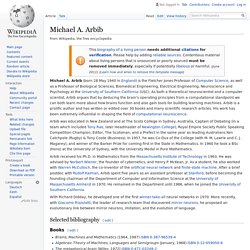
Arbib (born 28 May 1940 in England) is the Fletcher Jones Professor of Computer Science, as well as a Professor of Biological Sciences, Biomedical Engineering, Electrical Engineering, Neuroscience and Psychology at the University of Southern California (USC). As both a theoretical neuroscientist and a computer scientist, Arbib argues that by deducing the brain's operating principles from a computational standpoint we can both learn more about how brains function and also gain tools for building learning machines. Arbib is a prolific author and has written or edited over 30 books and many scientific research articles. His work has been extremely influential in shaping the field of computational neuroscience. Arbib received his Ph.D. in Mathematics from the Massachusetts Institute of Technology in 1963.
Selected bibliography[edit] The USC Brain Project. Dr.
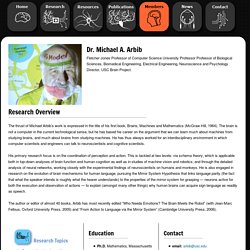
Michael A. Arbib Fletcher Jones Professor of Computer Science University Professor Professor of Biological Sciences, Biomedical Engineering, Electrical Engineering, Neuroscience and Psychology Director, USC Brain Project. Research Overview. Rodney Brooks. Rodney Allen Brooks (born 30 December 1954[1]) is an Australian roboticist, Fellow of the Australian Academy of Science, author, and robotics entrepreneur, most known for popularizing the actionist approach to robotics.
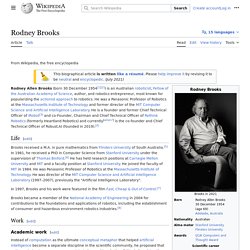
He was a Panasonic Professor of Robotics at the Massachusetts Institute of Technology and former director of the MIT Computer Science and Artificial Intelligence Laboratory. He is a founder and former Chief Technical Officer of iRobot[2] and co-Founder, Chairman and Chief Technical Officer of Rethink Robotics (formerly Heartland Robotics). Frederic Bartlett. Sir Frederic Charles Bartlett FRS[1] (20 October 1886 – 30 September 1969) was a British psychologist and the first professor of experimental psychology at the University of Cambridge.

He was one of the forerunners of cognitive psychology. Bartlett considered most of his own work on cognitive psychology to be a study in social psychology, but he was also interested in anthropology, moral science, philosophy, and sociology.[2][3][4][5] Bartlett proudly referred to himself as "a Cambridge Psychologist" because while he was at the University of Cambridge, settling for one type of psychology was not an option.[5] Biography[edit] Rodney Brooks. David Chalmers. David John Chalmers (/ˈtʃælmərz/;[1] born 20 April 1966) is an Australian philosopher and cognitive scientist specializing in the area of philosophy of mind and philosophy of language.
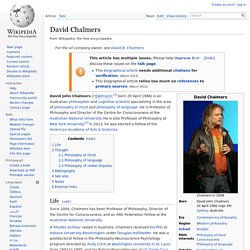
He is Professor of Philosophy and Director of the Centre for Consciousness at the Australian National University. He is also Professor of Philosophy at New York University.[2] In 2013, he was elected a Fellow of the American Academy of Arts & Sciences. Life[edit] Since 2004, Chalmers has been Professor of Philosophy, Director of the Centre for Consciousness, and an ARC Federation Fellow at the Australian National University. A Rhodes Scholar raised in Australia, Chalmers received his PhD at Indiana University Bloomington under Douglas Hofstadter.
Henri Delacroix. Un article de Wikipédia, l'encyclopédie libre.
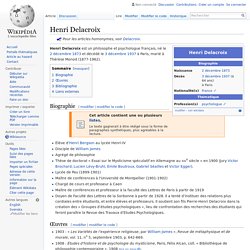
Henri Delacroix est un philosophe et psychologue français, né le 2 décembre 1873 et décédé le 3 décembre 1937 à Paris, marié à Thérèse Monod (1877-1962). Biographie[modifier | modifier le code] Élève d’Henri Bergson au lycée Henri-IVDisciple de William JamesAgrégé de philosophieThèse de doctorat « Essai sur le Mysticisme spéculatif en Allemagne au XIVe siècle » en 1900 (Jury Victor Brochard, Lucien Lévy-Bruhl, Emile Boutroux, Gabriel Séailles et Victor Egger).Lycée de Pau (1899-1901)Maître de conférences à l’Université de Montpellier (1901-1902)Chargé de cours et professeur à CaenMaître de conférences et professeur à la faculté des Lettres de Paris à partir de 1919Doyen de Faculté des Lettres de la Sorbonne à partir de 1928.
Il a tenté d’instituer des relations plus cordiales entre étudiants, et entre élèves et professeurs. Œuvres[modifier | modifier le code] Bibliographie[modifier | modifier le code] Serge Nicolas (préf. Ouvrages en ligne. William Ross Ashby. Un article de Wikipédia, l'encyclopédie libre.
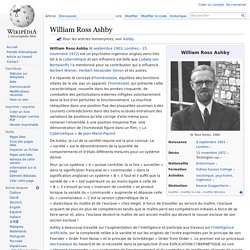
Pour les articles homonymes, voir Ashby. W. Ross Ashby, 1960. William Ross Ashby (6 septembre 1903, Londres – 15 novembre 1972) est un psychiatre-ingénieur anglais venu très tôt à la cybernétique et son influence est telle que Ludwig von Bertalanffy l’a mentionné pour sa contribution qui a influencé Norbert Wiener, Herbert Alexander Simon et les autres.
Franz Boas. Signature Biographie[modifier | modifier le code] Boas est né à Minden (province de Westphalie) en 1858 [3] dans une famille juive ashkénaze.

Il est tout d'abord formé aux mathématiques et à la physique dans plusieurs universités allemandes : Heidelberg, Bonn et Kiel. En 1881, il obtient dans cette dernière un doctorat en présentant une thèse sur les variations de la couleur de l'eau de mer. Personnalités. Prix Turing. Un article de Wikipédia, l'encyclopédie libre. Pour les articles homonymes, voir Turing. Le prix Turing ou ACM Turing Award, en hommage à Alan Turing (1912 – 1954), est attribué tous les ans depuis 1966 à une personne sélectionnée pour sa contribution de nature technique faite à la communauté informatique[1].
Les contributions doivent être d’une importance technique majeure et durable dans le domaine informatique. La récompense est décernée par l’Association for Computing Machinery (ACM)[2]. Cette récompense a été créée par l’InterTrust Technologies Corporation’s Strategic Technologies and Architectural Research Laboratory (STAR Lab). Prix Donald E. Knuth. Un article de Wikipédia, l'encyclopédie libre. Le prix Knuth récompense les scientifiques ayant apporté une contribution exceptionnelle en informatique théorique.
Il porte le nom de Donald E. Prix Gödel. Амосов, Николай Михайлович. Анохин, Пётр Кузьмич. Пётр Кузьми́ч Ано́хин (14 (26) января 1898, Царицын — 5 марта 1974, Москва) — советский физиолог, создатель теории функциональных систем, академик АМН СССР (1945) и АН СССР (1966), лауреат Ленинской премии (1972). Биография[править | править вики-текст] Родился 14 (26) января 1898 года в Царицыне (ныне Волгоград) в семье рабочего. В 1913 году окончил высшее начальное училище. Michael A. Arbib. Jacques Arsac. Un article de Wikipédia, l'encyclopédie libre. Jacques Arsac meurt le 14 janvier 2014. Exel[modifier | modifier le code] Le langage de Jacques Arsac permettait de préciser aussi bien les caractéristiques des données (matrice quelconque, matrice triangularisée, etc.) que les algorithmes eux-mêmes (par exemple produit matriciel).
Un algorithme d'inversion de matrice que l'on composait avec les caractéristiques d'une matrice triangulaire donnait automatiquement par simplifications algébriques un algorithme simplifié d'inversion optimisé pour les matrices triangulaires, par exemple. Voir également langage Haskell. Tim Berners-Lee.
Un article de Wikipédia, l'encyclopédie libre. Tim Berners-Lee Tim Berners-Lee en 2010. Compléments Timothy John Berners-Lee, KBE, né le 8 juin 1955 à Londres, est un citoyen britannique, principal inventeur du World Wide Web (WWW) au tournant des années 1990. En juillet 2004, il est anobli par la reine Élisabeth II pour ce travail et son nom officiel devient Sir Timothy John Berners-Lee. Alfred Binet. Un article de Wikipédia, l'encyclopédie libre. Pour les articles homonymes, voir Binet. Alfred Binet Alfred Binet (Alfredo Binetti), né le 8 juillet 1857 à Nice et mort le 18 octobre 1911 à Paris, est un pédagogue et psychologue français. Il est connu pour sa contribution essentielle à la psychométrie. Maurice Bloch. Un article de Wikipédia, l'encyclopédie libre. Pour les articles homonymes, voir Bloch. Maurice Bloch est un anthropologue britannique d'origine française.
Il est né en 1939 à Caen. Pascal Boyer. Un article de Wikipédia, l'encyclopédie libre. Pour les articles homonymes, voir Boyer. Ses domaines de recherche sont l'anthropologie et la psychologie. Il a notamment travaillé parmi les Fangs du Cameroun. Barth Britt-Mari - auteur. Professeur émérite à l'Institut Catholique de Paris et Professeur invité à l'Université Catholique de l'Ouest. Biographie : Luca Cardelli. Edward S. Casey. Edward S. Casey (born February 24, 1939 in Topeka, Kansas) is an American philosopher and university professor. After studying at Yale (BA 1961), he received his PhD from Northwestern University (1967) and has taught at Yale University, the University of California at Santa Barbara, the New School for Social Research, Emory University, and several other institutions. He is Professor of Philosophy at Stony Brook University, New York. Edward Casey was president of the American Philosophical Association (Eastern Division) and Dean of the Faculty of Arts at Stony Brook University.
He conducts research in terms of aesthetics, the philosophy of space and time, ethics, perception, and psychoanalytic theory. Jean-Pierre Changeux. Un article de Wikipédia, l'encyclopédie libre. Jean-Pierre Changeux Compléments. Étienne Bonnot de Condillac. Yves Coppens. Kazimierz Dąbrowski. Antonio Damasio. Charles Darwin. La Filiation de l'homme et la sélection liée au sexe. Stanislas Dehaene. Stanislas DEHAENE. Daniel Dennett. The Mind's I. Page de Jean-Pierre Desclés.
Robert Dilts. Georges Dumas.